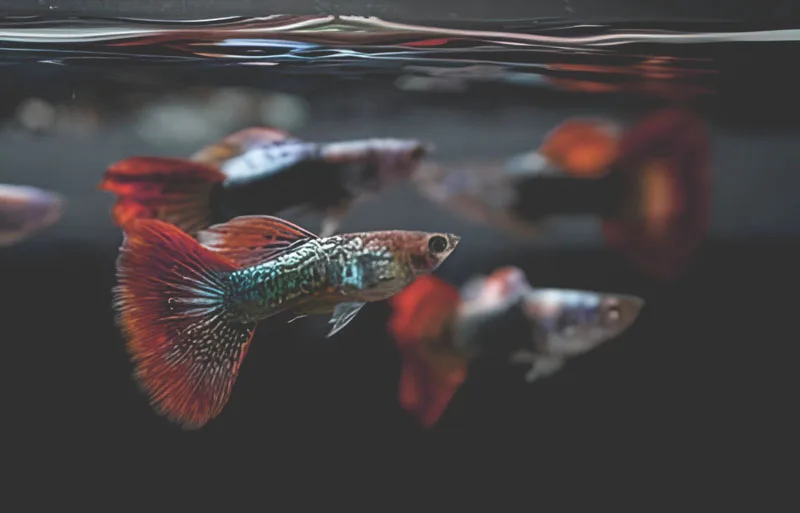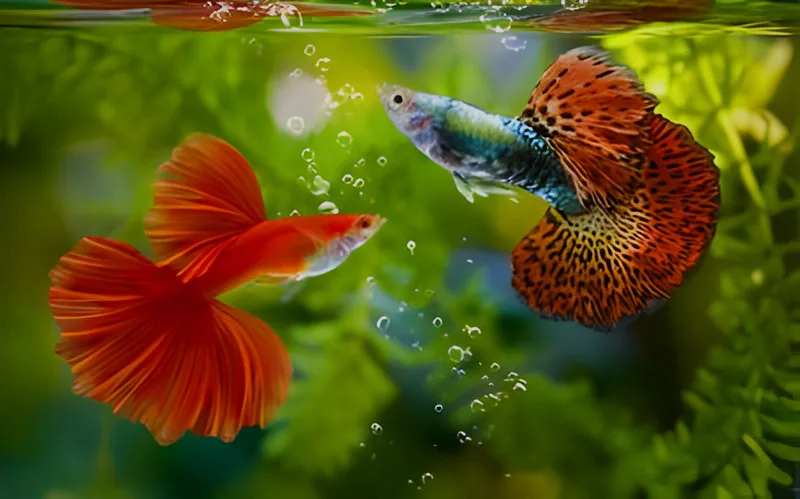Introduction to Guppy Fish Lifespan
As you might now, life expectancy of your aquarium residents is crucial in the choice of fish for your tank when you are an aquarium enthusiast. In that regard, you will certainly be very careful to choose the right type of fish which will ensure their longevity and health. Guppy fish can be found in a wide variety of colors and they are incredibly friendly, which make them a common choice for freshwater aquariums. It is a question of how long they guppy fish would live. In this article, we will be taking a closer look at the wonderful world of guppy fish lifespan, and you will learn of the things that can change the numbers of years that these beautiful fish can live for.
Factors That Affect the Lifespan of Guppy Fish
Among the many contributing factors that determine how long guppy fish live for there are some, in particular. Genes, environmental factors and care are undoubtedly three key elements determining how long fish outlives. Now we examine each component in turn.
Genetics: Guppy fish, for example, just like any other living organism, have genetic traits that are passed on by the parents. The particular genetic changes can have impact on the life span of some individuals, like those who will be more exposed to health concerns or the life length is shortened.
Environment: The surroundings of the aquarium for the guppy equally are important factors affecting the lifespan of fish. Situations such as adverse water condition, extreme temperature, or the existence of stressors all affect how long the fish survive. The habitat that works best is the habitat that satisfies their special requirements.
Care: The wellbeing and useful lifetime of guppy fish depend on correct care. Feeding, upkeeping your tank water conditions, and choosing suitable tankmates are crucial activities which must be carried out for guppy fish care. Failing to acknowledge or take on these roles can therefore result in tension, illness and/or shortened life span.

Breeding Strategies to Increase Guppy Fish Lifespan
Guppy fish lifespan can be elevated with the aid of breeding strategies. The breeders apply different breeding techniques to produce healthy and long-lived guppies. A major tactic is to prevent inbreeding since it may cause such problems as genetic abnormalities and shortened lifespan. To genetically diversity and improve the overall health and longevity of the guppies, breeders may add unrelated guppies to the breeding program.
Another tactic used is cross-breeding. Through intercrossing distinct guppy strains, breeders can enrich the genetic variation and improve the lifespan of the next generation. Hybrid guppies displaying hybrid vigor manifest with stabilized overall health and longer lifespan. However, this hybridization should be done carefully, taking into account the parent strains’ compatibility and genetic problems.
The Role of Genetics in Guppy Fish Lifespan
Genetics plays a great role in determining the lifespan of these fish. Guppies inherit their genes from their parents in the same way as us human beings, and their longevity genes are no exception to rule. Within the guppy species, some strains have a genetic tendency to survive longer while yet others get shortened lifespan.
Through selective breeding, breeders are able to establish and maintain populations of guppies with extended lifespans. Breeders are selective in choosing guppies with common traits such as strong health and resistance to prevalent illnesses and then use them to generate offspring capable of longer life periods. The process of breeding guppies with longer life expectancy is the way to steadily lengthen the life of a guppy population.
Average Lifespan of Guppy Fish in Captivity
On average, guppy fish live for about 2 to 3 years in captivity. However, this is just a general estimate, and individual lifespans can vary greatly depending on various factors. With optimal care and a favorable environment, some guppy fish have been known to live up to 5 years or even longer.
Longevity of Guppy Fish in Optimal Conditions
Making sure that you give your guppies the optimal conditions is called into question, can as much as double their lifespan. Here are some key factors to consider:Here are some key factors to consider:
1. Water quality: Guppies are considered among the aquarium species that live in clean water systems that are adequately maintained. While important components, such as frequent water changes, filtration, stable water parameters are the key to their health and, such, life duration.
2. Temperature: The guppy is a fresh-water fish and there for its suitable kept in water that has temperature of 72° F and 82° F (22° C to 28° C) It is important to keep the temperature range within this scale, for the welfare of the children.
3. Diet: It is the balanced and nutrient rich diet that fish needs to maintain their good health while guppy fish are concerned. For this reason, provide these species with high-quality commercial fish food, and give them several treats like live or frozen tiny animals.
4. Tank size and habitat: Guppies are fish which like to swim actfluid. Thus, generous area to “discover” is appreciated by them. A minimum 10 gallons tank, decorated with branches and plants, will help with their condition.

Common Health Issues That Can Affect Guppy Fish Lifespan
Despite their hardy nature, guppy fish are susceptible to certain health issues that can impact their lifespan. Here are some common ailments to be aware of:Here are some common ailments to be aware of:
1. Fin rot: Water-borne infection might be caused by the bacteria in our bodies due to their low-quality water or our stressful lifestyle. As a result, the fish which has this degenerative disease may begin to lose the fins and can get killed if nothing is done to treat it.
2. Dropsy: Dropsy is a disease characterized in the body of a fish by the abnormal development of fluid influencing the fish to look swollen. It is commonly a manifestation of the symptoms of the underlying health condition but could be extremely tough to cure as well.
3. Swim bladder disorder: Coordination of the equilibrium and thus the up and down positions is disrupted for a guppy fish suffering from insufficient swim bladder. It may result from causes including overfeeding, constipation, or infection. You may also read: Instruction: Humanize the given sentence.
Tips for Extending the Lifespan of Guppy Fish
If you want to ensure that your guppy fish live long and healthy lives, consider implementing the following tips:If you want to ensure that your guppy fish live long and healthy lives, consider implementing the following tips:
Maintain water quality: Consistently doing water changes and stocking effective filter media are very important for maintaining clean and pure water. Regular check the water parameters to make sure that they are within the right scope.
Provide a balanced diet: To ensure that your guppy gets a mixed but balanced diet, feed it with high-quality commercial fish food and give it the occasional treats. Make sure that the animals will never overfeed so the chance of making obesity and other complications would be avoided.
Avoid overcrowding: Guppy fish are inseparable natures of the fish, but too much fish can lead to more stress and spreading diseases like high stress among them. Besides that, give them enough area to avoid placing too many fish in company.
Quarantine new fish: Isolate any new fish you aquire in advance to keep any diseases within their carriers from spreading to the rest of your tank. The doing this will teach you to preserve the health of your mature guppy fish.

Techniques for Determining the Age of a Guppy Fish
Having certainty about the age of fish guppy is not easy, because these species does not have any chearful signs related to aging. However, there are a few techniques that can provide some insight:However, there are a few techniques that can provide some insight:
Size: Aged fish with a higher degree of experience tend to be big. More youthful fish, on other hand, are relatively small.
Coloration: With advancing years of the guppy the fish coloring often becomes richer and more definite. But this is individual-dependence especially from their genetic features.
Fertility: Before one to two months of age, female livebearers gain sexual maturity. The female abdomen may have the eggs already developed or a characteristic usually associated with mature female fish known as gravid spot. Thus, the presence of fry or a gravid spot could also mean that the female is sexually mature.
The Importance of Proper Nutrition and Care in Maximizing Guppy Fish Lifespan
While genetic and breeding techniques obviously are of great importance, good quality nutrition and care also have to the highest standards in attaining the maximum life expectancy in guppy fish. Feeding guppies with a diet rich in the nutrients they require to maintain a healthy state and life expectancy is vitally important. Top-grade commercial guppy feed, as well as the addition of small live/frozen food, can supply the fish with all the nutrients required for good health.
Keeping aquarium clean and tidied up is of great importance for guppies to have a long life and be in healthy condition. Timely water replacement, good filtration and keeping optimal water shall is necessary. Guppies that experience poor water conditions may be susceptible to increases in stress levels, diseases, and reduced lifetimes. Moreover, besides giving hiding places along with an attractive decoration and plants, the one that helps to increase longevity and reduce stress should be also provided.
The Future of Guppy Fish Breeding and Genetics
There are exciting opportunities ahead for guppy fish breeding and genetics. As genetic research and breeding methods improve, breeders are able to create new guppies breeds with better lifespans than ever before. Genetic mapping and identification of specific genes responsible for longer life can further improve the programs of breeding in guppies by enabling the breeders to selectively breed guppies who live longer.
In addition, genetic engineering, the newly emerging area of science, may also generate possibilities in guppy fish breeding. Scientists can alter particular genes in such a way that the natural lifespan of guppies can be extended. But, the ethical aspects and possible threats of genetic manipulation must be properly examined before implementing such methods.
Finally, breeding and genetics have a significant impact on the lifespan of guppy fish. Selective breeding of guppies that have desirable traits and appropriate breeding techniques can be used by breeders to gradually increase the lifespan of existing guppy populations. Genetics is not the only determinant of longevity. Both nutritional provision, care and a suitable living environment are equally key in making guppies live longer. The future is actually bright for guppy fish fans as the ongoing technology in breeding and genetic research could open doors to developing guppy type that are expected to be longer lived and healthier.
Conclusion
The life span of guppy fish is significantly limited by four factors which are genetics, environment, and care, and one of them outweighs the other two. In optimal conditions and if well taken care of there is a possibility of such fish at least 5 years and many years more than that. As you design the habitat, ensure that it is suitable, keep water quality at optimal levels, and address any health concerns as soon as they arise to allow your guppies to live long and healthy. Research your particular species in advance with future additions to your aquarium to ensure they are equipped to thrive in your tank setup. Empowered with proper know-how and enthusiasm, you can transform your tank into a wonderful aquatic terrain that will look like a bright and alive home for your fish and remain your favorite companion for years.
